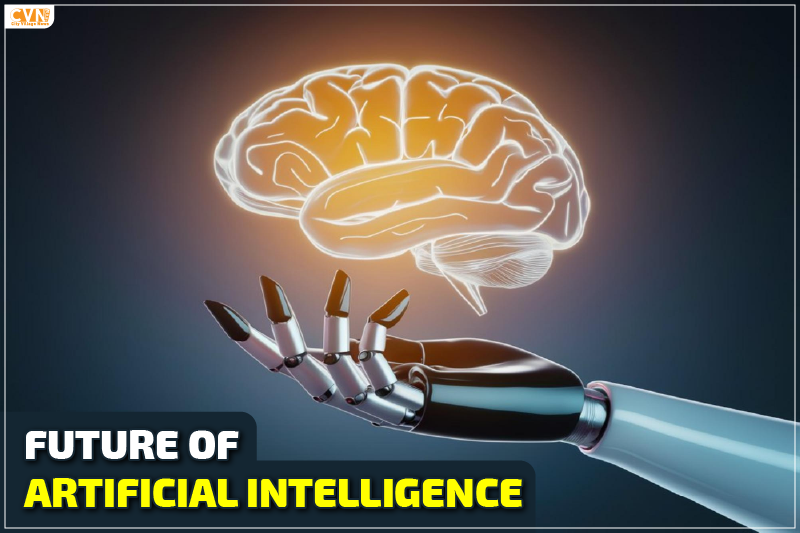With all the jazz around artificial intelligence, there’s no process or industry that can evade this new technological evolution. AI has been revolutionizing customer service, aviation, hospitality and even the health industry. But what is the future of artificial intelligence? According to many experts, the answer lies in understanding the evolution of the human brain.
The brain is an extraordinary organ that has evolved over millions of years to become the most advanced structure known to science. Interestingly, this evolution is not just a story of biology but a journey that in a way intersects with the future of technology, especially AI. Continue reading to know more about how the future of AI is linked with the evolution of the brain.
Understanding Neural Networks
The human brain operates through a huge network of neurons. These neurons communicate with each other via electrical impulses. Neural networks are the foundation of all cognitive processes. This can include anything from simple reflexes to complex decision-making. Interestingly, AI development has taken inspiration from these biological networks. In a way, artificial neural networks that form the basis of machine learning and deep learning, mimic the way human neurons work. After thoroughly studying the brain’s structure and functionality, scientists have been able to create more sophisticated AI models. These can learn, adapt, and even solve problems in ways that can resemble human thinking.
Cognitive Functions and AI Development
Did you know that cognitive functions such as memory, learning, and problem-solving are central to both human intelligence and AI? The evolution of the human brain has equipped us with these abilities. This allows us to survive and thrive in a complex world. AI seeks to replicate these cognitive functions in order to perform tasks that require perception, reasoning, and decision-making. For instance, AI systems are being carefully-designed to recognize patterns, predict outcomes and even make decisions based on vast amounts of data. Artificial intelligence (AI) researchers can build more sophisticated systems that are close to human-like cognition by studying how the brain processes information.
Creativity and Innovation
Human creativity is believed to be a result of millions of years of brain evolution. Notably, this creativity has led to remarkable innovations. Be it in the fields of art and music to technology and science. Artificial intelligence, while still in its earlier stages compared to human creativity, is beginning to show decent signs of innovation. These days, there are AI systems that have been developed to compose music, create art, and even write poetry. The future of AI will likely see further advancements in creative tasks. This will be driven by insights into how the human brain generates new ideas and solutions. Furthermore, as AI continues to evolve, there are chances that it may develop its own forms of creativity. According to many, this will push the boundaries of what is possible.
The Role of Emotions in AI
It’s a fact that emotions play a crucial role in human intelligence. They influence decision-making, social interactions, and even learning processes. The evolution of the human brain has allowed us to experience a wide range of emotions. This in turn has shaped our behaviors and societies. AI, which was traditionally seen as logical and unemotional, is now beginning to incorporate emotional intelligence. Researchers are also exploring how AI can recognize and respond to human emotions. This will make interactions with machines more natural and intuitive. Scientists can create artificial intelligence (AI) that better comprehends and responds to human emotions by researching how the brain processes emotions. This would enhance communication between humans and machines.
Adaptability and Learning
The capacity of the human brain to adapt and gain knowledge from new experiences is among its most amazing features. Our ability to adapt has been essential to our existence since it has allowed us to change with our surroundings and flourish. More and more AI systems are being created with comparable learning and adaptability in mind. For instance, machine learning methods allow AI to learn from data and gradually enhance its performance. A kind of machine learning called deep learning simulates how the brain recognizes patterns and makes decisions. According to many, the future of artificial intelligence seems bright as AI will become more sophisticated in its flexibility as it develops. It may even match the brain’s capacity for learning and evolution.
Ethical Considerations
Not only has the human brain evolved to become more intelligent, but it has also molded our morality and ethics. AI development is currently being guided by these ethical principles. As artificial intelligence (AI) systems develop, concerns regarding the morality of building computers with human-like thought and behavior grow. The future of AI heavily depends on issues like accountability, fairness, and privacy. Researchers can create artificial intelligence that is consistent with human values by comprehending how the brain makes ethical decisions. As AI is incorporated into society more and more, this ethical alignment is essential to ensuring that technology advances humanity rather than undermines it.
The Future of Human-AI Collaboration
We are already building machines that have the ability to think, learn, and even create thanks to the evolution of the human brain. AI in the future most likely calls for tight human-machine cooperation. This partnership may result in previously unheard-of breakthroughs in technology, science, and medicine. Some of the trickiest issues facing humanity could be resolved if we combined the advantages of artificial intelligence (AI) with the special capabilities of the human brain. Concerns concerning the future of human identity and the place of AI in society may also be raised by this collaboration. It will be crucial to make sure that this cooperation advances mankind as a whole as AI develops.
India and Human-Centric AI Development
India is prioritizing human-centric AI development and partnering with the UK and Japan. During the G7 Outreach Summit, Prime Minister Narendra Modi emphasized the significance of fair, transparent, and secure AI. India hopes to pioneer the use of ethical AI through global collaborations and technological advancements. A $1.24 billion effort to advance AI in the nation was approved; it is in line with the organization’s “AI for All” purpose, which seeks to guarantee that technology advances humanity.
Now you know that the evolution of the human brain and the future of artificial intelligence are inextricably linked. Humans are now prepared to create artificial intelligence (AI) that mimics human intelligence as we gain more knowledge about the composition, operations, and potential of the brain. The next wave of innovation is being driven by the relationship between biology and technology, and AI systems may eventually equal or even exceed the cognitive capacities of the human brain. But this future also necessitates giving ethical considerations and societal effects considerable thought. In addition to advancing AI, ongoing brain research will guarantee that this technology is created in a way that improves human lives.
Also Read: Transforming Healthcare with Artificial Intelligence
What do you think about artificial intelligence and the future of humans? Do you also think that the future of artificial intelligence lies in understanding the evolution of the human brain? Comment below and let us know about your thoughts about AI and brain development.
| Disclaimer: City Village News claims no credit for the images featured on its blog site. All the visual content is copyrighted to its respective owners only. We mention the source name of the picture whenever possible and found. However, please get in touch with us if we miss acknowledging the owner’s source. In case the owners don’t want us to use their images, we will remove them promptly. We believe in providing proper attribution to the original author, artist, and photographer. |

